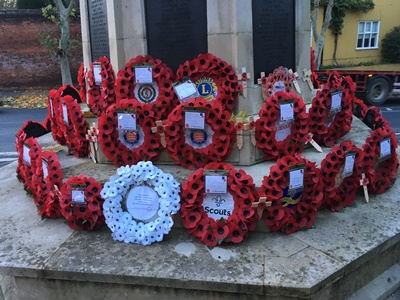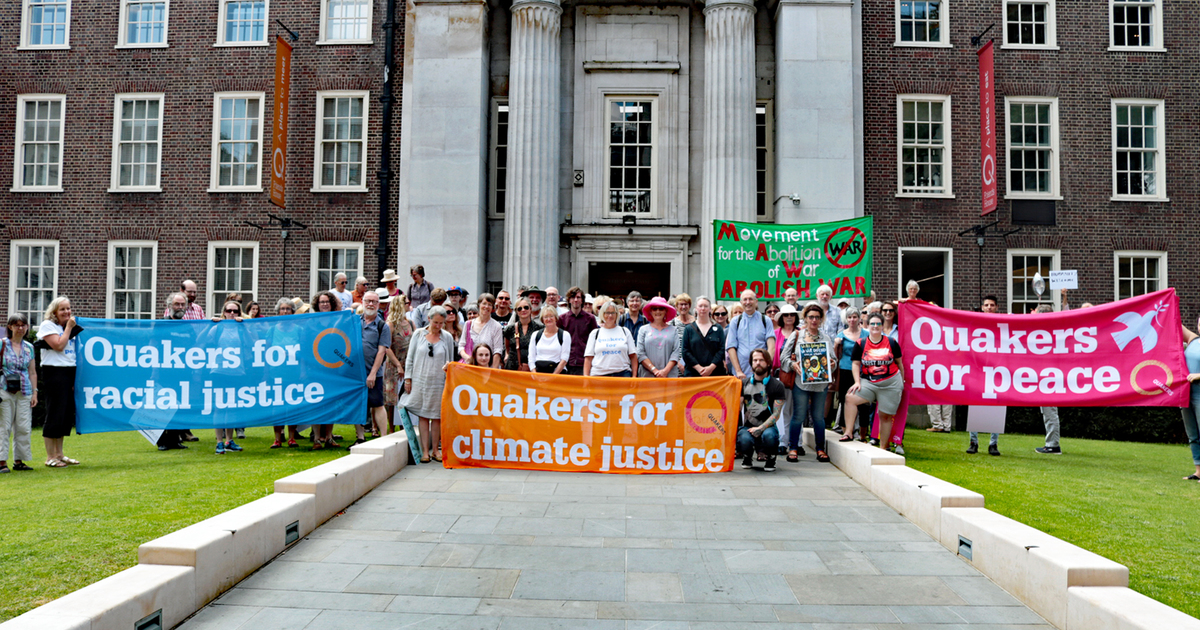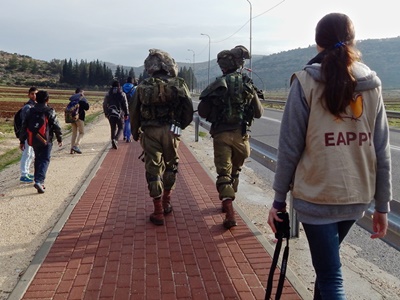Action in the world
For Quakers the Meeting for Worship is often a call to action, to be an instrument of peace in our own relationships, our communities and the wider world.
True godliness does not turn men out of the world, but enables them to live better in it, and excites their endeavours to mend it…
William Penn, 1682
Current projects
Clicking on the Quaker logos below will direct you to further information on our national website.
Local engagement

As well as worshipping together, Essex Quakers engage with local projects covering green issues, human rights, peace, education and politics.
Throughout Britain

Quakers currently campaign for three social justice concerns nationally: migrant and refugee rights, housing conditions, and a more compassionate criminal justice system.
Quakers work to promote the Quaker testimonies in many ways.
These testimonies are statements of experienced truths that many people hold dear, Quaker or not, and can be summarised as Sustainability/Simplicity, Peace, Integrity, Community and Equality.
We believe these truths and values cannot be promoted in isolation from each other but need to be seen as different faces of the same jewel.
Some key history events
Quakers have since our inception been radicals. Here is a timeline of some key interventions Quakers have been responsible for.
Click on a box’s cross to reveal information.
1660: Pacifism - 'The spirit will never move us to fight'
From 1659 the climate in England started to turn against the many sects that had appeared around the time of the civil war. Quakers became associated with radical groups such as the Fifth Monarchy Men and the Levellers. This fear of radical elements in society reached its peak in 1660, with the restoration of Charles II to the throne, and a subsequent purge of the leaders of the regicide. Quakers suffered systematic persecution with imprisonments, the breaking up of Quaker meetings and mob attacks. Quakers petitioned Charles II and Parliament in 1660 and 1662 for freedom of conscience in religious matters. For the first time Quaker commitment to nonviolence was expressed. The testimony for peace that Margaret Fell delivered to King and Parliament developed into a corporate testimony, and this has stayed at the core of Quaker religious experience, leading to war relief work and conflict transformation. Our current peace work ranges from peace education to disarmament.
1688: Antislavery movement begins
1787: Antislavery becomes the first Human Rights Movement
Having put our own house in order Quakers saw a need for the wider emancipation of slaves. However, there was no mechanism for diverse people to unite behind a single cause. Quakers in London decided to set up a secular committee to achieve the seemingly impossible – inviting three non-Quakers with influence to work with nine Quakers to establish the Society for the Abolition of the Slave Trade. The Society, being what is recognised as the first human rights organisation, had to find new techniques for furthering its cause, many of which remain in use today. Once the Slave trade was legislated against in 1807 the society turned towards campaigning for the emancipation of existing slaves (i.e. those who had already been traded or were born into slavery) and in 1833 saw through the Slavery Abolition Act. Quakers were also key in the underground railroad providing safe houses for escaped slaves and in providing education and training for freed slaves .
1796: Restorative Mental Health
A family of York Quakers, the Tuke’s, founded the Retreat. This was the first institution to work towards restoring mental health and developed the foundations of many of the talking therapies which are still used. One of the family, Daniel Hack Tuke, who wrote the Manual of Psychological Medicine and who was considered for many years the authority on insanity, is buried in the Quaker Burial Ground behind Saffron Walden Meeting House.
1798: Adult Education movement
Though excluded from state/church schools and universities for many decades, Quakers have long held education in high esteem. Locally the Friends School in Saffron Walden began life in 1702 as a penny school next to a workshouse in Clerkenwell, London, to provide education for the poor as well as for Quaker children excluded from mainstream schools. In 1798 a Quaker, Samuel Fox, opened a school for young factory working women and Quakers began an enduring support of the adult education movement.
1847: Famine relief in Ireland
The Central Relief Committee identified the hardship of those in Ireland who were most affected by the potato famine and organised provision of relief.
1860s: Fair and fixed pricing
Until the 1860s common practice was to barter on prices for everything. Quakers belief in honesty meant they would always have to offer their best price, if asked, and so were unsuited to haggling. The obvious next step was to charge for goods at a fixed price which became popular with purchasers who could now send children or others unsuited to haggling on errands. The practice became a selling point until it became the norm for all sellers.
1895: Open to all light
The Manchester Conference as it has become known was when Quakers examined what was truly core to us in our beliefs and actions. It was significant because of two shifts in attitude: Quakers had always been ‘universalist’, believing that the Christian God would save all, but there was a shift towards a universalist view of God – in that one did not need to believe in a Christian God to take part in Quaker worship and that Quakers should be ‘open to new light’. We also decided that the light could shine through the arts, and that Quakers no longer needed to shun music and other arts but could embrace them.
1930s: Kindertransport and offering sanctuary
In the 1930s Quakers identified the rise of Nazism in Germany and beyond, and offered practical help where possible. Quaker schools offered scholarships for young Jews from the affected areas and many Quaker families offered ’employment’ to Jews and their families to enable escape. Though often this meant Quaker families sharing their modest homes, Quakers were thougth to be responsible for the emigration of around 10,000 souls.
1942: Famine Relief Committee Network
1947: Nobel Peace Prize
Quakers responded quickly after the war in offering relief to those in some of the most ravaged areas of the continent. This work was recognised in 1947 by the awarding of the Nobel Peace Prize jointly to the Friends Service Council in London and the American Friends Service Committee.
1963/4: Black rights in the USA
Bayard Rustin, a Black Quaker, altered the course of the struggle for black rights. He convinced Martin Luther King Jr that the struggle must be peaceful rather than armed and he also organised the march on Washington for Jobs and Freedom. Quakers don’t have ‘saints’, believing that everyone should try to live according to the light they have been given, but if we did… After the march, American Quakers as previous recipients, nominated Martin Luther King Jr for Nobel Peace Prize which he was duly awarded.
1968: Towards a Quaker view on sex
2009-2013: Same Sex Marriage
Though Quakers had been welcoming of LGBTs for 50 years, it took until 2009 for us to discern that we needed to fight for equality outside of our religious society and for the right for same sex marriages to be legally recognised as having the same status as opposite sex ones. Though political groups had been lobbying for equal or gay marriage, Quakers were the first religious group to ask for same sex marriage to be recognised. This finally came into law, using the name we had proposed, as the Marriage (Same Sex Couples) Act in 2013.

